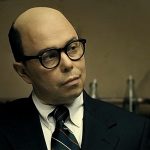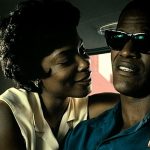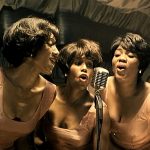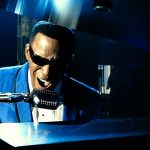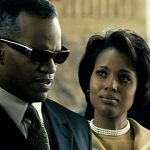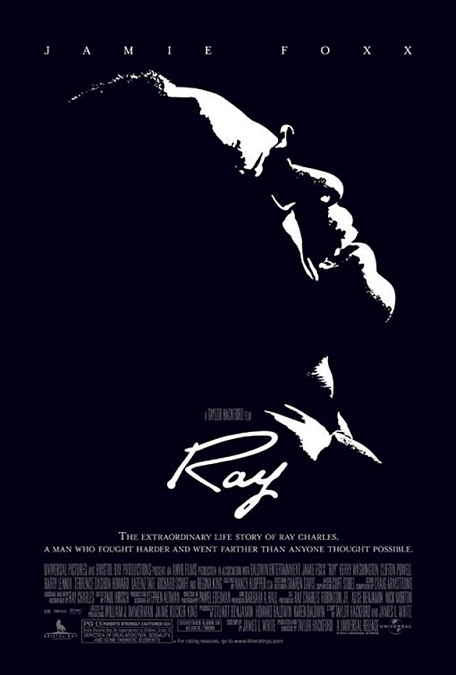
Ray – 2004
Ray was a well-made biopic movie about the career of superstar, Ray Charles. And I have to start off by mentioning what I liked most about the movie. It didn’t pretend the blind musical genius was a saint who faced racism, prejudice, or difficulties due to his handicap. True, those hardships were all parts of his life, but the film portrayed him as he was, a bad husband, a heroine junkie, an adulterer, and a brilliant musician, unparalleled in his charisma, charm, and talent. Granted, I have never been a huge fan of his genre of music, but even I cannot deny that he was one of the great song writers and entertainers of the 20th century.
Jamie Fox won the Academy Award for Best Actor for playing the title role, and let me say, he really deserved it. He was phenomenal. He looked the part, acted the part, and clearly did his research. His voice, his mannerisms, the way he moved, and the entire performance was spot on, and I’ve seen enough footage of the real Ray Charles to know. But not only did he have the challenge of portraying the famous and iconic figure, but he also had to play the part of a man spiraling down into the depths of a drug addiction. He was incredible. Well done Jamie.
In addition to all that, I have learned that Foxx actually played his own piano for the film. Whenever a musician is playing an instrument on the screen, it is usually pretty easy to tell if they are actually playing or not. Foxx, like the real Ray Charles, started learning to play the piano at a very young age. In fact, as the film was still in the casting stage, Ray Charles met with Jamie Foxx and the two had an intense music session in which Foxx impressed Charles at the keyboard, after which Charles was quoted as saying, “This is it. This kid can do it, see? He’s the one.”
The film follows Ray through the highs and lows, mostly highs, of his career from 1948 until 1964. It also had a number of flashbacks to his early childhood, showing how he had not been born blind. He could see until he was about seven years old, not long after the death of his younger brother George, who had died in front of Ray. C. J. Sanders played the young Ray Charles Robinson. His mother, wonderfully played by Sharon Warren, out of love for him, forced Ray to be dependent on nobody but himself. Eventually she sent him away to a school for the blind, demanding that he be an educated man.
He started off as a back-up pianist, but soon his talent outshined those for whom he was playing. He began writing his own music and making his own recordings, touring, making record contracts and deals, and his career skyrocketed. But he had a habit of adhering to two vices. Women, and heroine. The one woman he eventually fell in love with, Della Bea, played by Kerry Washington, was able to put up with his absence due to his constant touring. She knew about and grudgingly allowed his constant cheating while he was on the road. But she seemed to take issue with his drug abuse, and eventually threatened to leave him if he didn’t conquer the addiction. Among the many women Ray seduced were Mary Ann Fisher, played by Aunjanue Ellis, and Margie Hendricks, played by Regina King, with whom he fathered a child. But whenever Ray had a break in his performance schedule, he would always return to Della.
The character of Ray was portrayed as being not only talented, but incredibly business savvy as well. After he began writing his own songs and making his own records, he made a deal with Atlantic Records. There, he met Ahmet Ertegun and Jerry Wexler, played by Curtis Armstrong and Richard Schiff. After he made a real name for himself, he made a deal with Sam Clark, played by Kurt Fuller, at ABC-Paramount Records, and his success just continued to grow.
Eventually he got into a bit of political activism. He was contracted to perform at a venue in the state of Georgia. But as he was walking to the concert hall, an angry crowd convinced him to walk away from the performance, as the audience would be segregated. He even went so far as to announce that he would not play at segregated halls any more. For this, the state of Georgia passed legislation which banned Ray from performing in the state. But in doing my research, I found that this was really the only major fabrication that was invented for the film. Georgia never banned Ray Charles from performing in the state. Thus, there was never a dramatic lift of the ban when Georgia took on his famous song, Georgia On My Mind, as the official state song.
And I have to make mention of some other members of the great cast like Regina King, Larenz Tate, playing Quincy Jones, Harry Lennix, Clifton Powell, playing Jeff Brown, Ray’s Band Manager who was eventually caught stealing from him, Terrence Howard as Gossie McKee, the sleazy guitarist in Ray’s first jazz trio, and Bokeem Woodbine as David “Fathead” Newman, one of Ray’s brass players who was also his heroine dealer. Throw in a bit part of an MC named Oberon, played by Warwick Davis, and Ray’s agent, Milt Shaw, played by David Krumholtz, and you have yourself a talented cast of actors. But really, Jamie Foxx overshadowed them all in his unforgettable portrayal of the incomparable Ray Charles.


